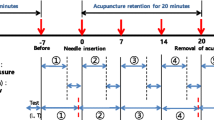Abstract
Acupuncture is a useful tool to treat many diseases, including cardiovascular disorders, but its modulation of stress-related responses is still debated. Aim of this study was to estimate whether the traditional Chinese acupuncture affected the transient impairment of the brachial artery flow-mediated dilation (FMD) produced by acute mental stress. In addition, since a high susceptibility to hypnosis attenuates the endothelial dysfunction elicited by mental calculation, the possible interaction between acupuncture and hypnotizability was investigated. Five low-to-medium and five medium-to-high hypnotizable healthy subjects joined two experimental sessions, for real and sham acupuncture. FMD and heart rate were measured in three conditions: baseline (PRE), after the real or sham acupuncture (ACU) and after mental calculation (MS). Needles were inserted into specific acupoints for real acupuncture and into non-acupoints, corresponding to the same spinal segment, for sham acupuncture. Results showed that the stress-related endothelial dysfunction was not modulated by acupuncture, but influenced by hypnotizability. In fact, highly hypnotizable subjects did not present any dysfunction, at variance with non-susceptible individuals that exhibited the expected stress-related FMD reduction (Mean ± SD; PRE, 12.10 ± 2.59; ACU, 10.73 ± 3.45; MS, 6.48 ± 1.72). Thus, hypnotizability appears more effective than acupuncture in contrasting the stress effects on the endothelial function. In conclusion, our study indicates the importance of patients' psychological evaluation in order to choose proper relaxation techniques and to evaluate therapeutic results and the necessity to integrate the alternative medicine practice with scientific research.
Similar content being viewed by others
References
Stux G, Pomeranz B. Basic of Acupuncture. 4th edn. Berlin: Springer-Verlag, 1998.
Richter A, Herliz J, Hjalmarsson A. Effect of acupuncture in patients with angina pectoris. Eur Heart J 1991; 12: 175–178.
Tam KC, Yiu HH. The effect of acupuncture on essential hypertension. Am J Chin Med 1975; 3: 369–375.
Shyu BC, Andersson SA, Thoren P. Circulatory depression following low frequency stimulation of the sciatic nerve in anesthetized rats. Acta Physiol Scand 1984; 121: 97–102.
Cao XD, Xu SF, Lu WX. Inhibition of sympathetic ner-vous system by acupuncture. Acupunct Electrother Res 1983; 8: 25–35.
Guimaraes CM, Pinge MC, Yamamura Y, Mello LE. Effects of acupuncture on behavioral, cardiovascular and hormonal responses in restraint-stressed Wistar rats. Braz J Med Biol Res 1997; 30: 1445–1450.
Yang CH, Lee BB, Jung HS, et al. Effect of electroacupuncture on response to immobilization stress. Pharmacol Biochem Behav 2002;72:847–855.
Haker E, Egekvist H, Bjerring P. Effect of sensory stimulation (acupuncture)on sympathetic and parasympathetic activities in healthy subjects. J Auton Nerv Syst 2000;79: 52–59.
Maeda M, Kachi H, Ichihashi N, Oyama Z, Kitajima Y. The effect of electrical acupuncture-stimulation therapy using thermography and plasma endothelin (ET–1)levels in patients with progressive systemic sclerosis (PSS). Dermatol Sci 1998;17:151–155.
Middlekau. HR, Hui K, Yu JL, et al. Acupuncture inhibits sympathetic activation during mental stress in advanced heart failure patients. J Card Fail 2002;8:399–406.
Middlekau HR, Yu JL, Hui K. Acupuncture effects on reflex responses to mental stress in humans. Am J Physiol Regulatory Integrative Comp Physiol 2001;280:R1462–R1468.
Chao DM, Shen LL, Tjen-Alooi S, Pitsillides KF, Li P, Longhurst JC. Naloxone reverses inhibitory effect of electro-acupuncture on sympathetic cardiovascular reflex responses. Am J Physiol Heart Circ Physiol 1999;276: H2127–H2134.
Ghiadoni L, Donald AE, Cropley M, et al. Mental stress induces transient endothelial dysfunction in humans. Circulation 2000;102:2473–2478.
Mangiafco RA, Malatino LS, Attina T, Messina R, Fiore CE. Exaggerated endothelin release in response to acute mental stress in patients with intermittent claudication. Angiology 2002;53:383–390.
Spieker LE, Hurlimann D, Ruschitzka H, Luscher TF, Noll G. Mental stress induces prolonged endothelial dys-function via endothelin-A receptors. Circulation 2002;105: 2817–2820.
Jambrik Z, Santarcangelo EL, Ghelarducci B, Picano E, Sebastiani L. Does hypnotizability modulate the stress-related endothelial dysfunction? Brain Res Bull, in press.
Weitzenhoffer AM, Hilgard ER. Stanford Hypnotic Susceptibility Scale, formC. Palo Alto, CA: Consulting Psychologist Press, 1962.
Crawford HJ. Brain dynamics and hypnosis:attentional and disattentional processes. Int J Clin Exp Hypn 1994;42: 204–232.
Corretti MC, Anderson TJ, Benjamin EJ, et al. International Brachial Artery Reactivity Task Force. Guidelines for the ultrasound assessment of endothelial-dependent.flow-mediated vasodilation of the brachial artery:a report of the International Brachial Artery Reactivity Task Force. J Am Coll Cardiol 2002;39:257–265.
Palinkas A, Toth E, Amyot R, Rigo F, Venneri L, Picano E. The value of ECG and echocardiography during stress testing for identifying systemic endothelial dysfunction and epicardial artery stenosis. Eur Heart J 2002;23:1587–1595.
Morelos M, Amyot R, Picano E, et al. Effect of coronary bypass and cardiac valve surgery on systemic endothelial function. Am J Cardiol 2001;87:364–366.
Hoffman JW, Benson H, Arns PA, et al. Reduced sympathetic nervous system responsivity associated with the relaxation response. Science 1982;15:190–192.
Jambrik Z, Sebastiani L, Picano E, Ghelarducci B, Santarcangelo EL. Hypnotic modulation of flow-mediated endothelial response to mental stress. Int J Psychophysiol, in press.
Boutouyrie P, Corvisier R, Azizi M, et al. Effects of acupuncture on radial artery hemodynamics:controlled trials in sensitized and naive subjects. Am J Physiol Heart Circ Physiol 2001;280:H628–H633.
Li P, Pitsillides KF, Rendig SV, Pan HL, Longhurst JC. Reversal of reflex-induced myocardial ischemia by median nerve stimulation:a feline model of electroacupuncture. Circulation 1998;97:1186–1194.
Yao T, Andersson S, Thoren P. Long-lasting cardiovascular depression induced by acupuncture-like stimulation of the sciatic nerve in unanaesthetized spontaneously hypertensive rats. Brain Res 1982;240:77–85.
Author information
Authors and Affiliations
Rights and permissions
About this article
Cite this article
Jambrik, Z., Chunzeng, L., Santarcangelo, E.L. et al. Traditional Acupuncture Does Not Modulate the Endothelial Dysfunction Induced by Mental Stress. Int J Cardiovasc Imaging 20, 357–362 (2004). https://doi.org/10.1023/B:CAIM.0000041939.61963.b0
Issue Date:
DOI: https://doi.org/10.1023/B:CAIM.0000041939.61963.b0




